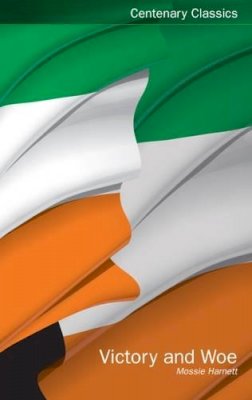6%OFF

Stock image for illustration purposes only - book cover, edition or condition may vary.
Victory and Woe
Mossie Harnett
€ 14.99
€ 14.03
FREE Delivery in Ireland
Description for Victory and Woe
Paperback.
The Centenary Classics series examines the fascinating time of change and evolution in the Ireland of 100 years ago during the 1916-23 revolutionary period. Each volume is introduced by Fearghal McGarry who sets the scene of this important period in Ireland's history. Victory and Woe is an account of life at the grassroots during the Irish War of Independence and the Civil War by the Officer Commanding, 2nd Battalion, West Limerick Brigade of the Irish Volunteers. Mossie Harnett (1893-1977), who fought on the Anti-Treaty side in the Civil War, describes his early life on a farm in Tournafulla in the southwest corner of Limerick, his enrolment in the Irish Volunteers in 1915, and his involvement in the conflict until his release from a Free State prison in 1923. In an appendix, the British troops' little-known and short-lived practice of taking hostages in order to protect themselves is vividly described by Mossie's cousin, Dr Edward Harnett, who was taken hostage in spring 1921. An introduction by Harnett's son-in-law, James H. Joy, places his father-in-law's text in the context of the revolutionary period.
Product Details
Format
Paperback
Publication date
2015
Publisher
University College Dublin Press
Condition
New
Number of Pages
168
Place of Publication
Dublin, Ireland
ISBN
9781906359980
SKU
V9781906359980
Shipping Time
Usually ships in 7 to 11 working days
Ref
99-2
About Mossie Harnett
Mossie Harnett (1893-1977) was a farmer in Limerick and a Limerick County Councillor before moving to Dublin in 1939. James H. Joy is Mossie Harnett's son-in-law, and Adjunct Professor of History at Northern Virginia Community College, Woodbridge, Virginia, USA. Fearghal McGarry is a lecturer in Modern Irish History at Queen's University Belfast.
Reviews for Victory and Woe
CENTENARY CLASSICS 'Greater familiarity with these sources - including the range of evocative first-hand accounts spanning the revolutionary decade from the Ulster crisis to the Civil War published as part of UCD Press's new Centenary Classics series - should complicate as well as inform commemoration in 2016. Although the achievements of the founding generation will be honoured and, inevitably, appropriated, the urge to celebrate independence should be tempered by an unsentimental understanding of the process by which it was achieved.' Fearghal McGarry 21 March 2016 Irish Examiner; 'UCD Press's new 'Centenary Classics' series makes available eye-witness accounts of key revolutionary episodes including the Ulster crisis; the aftermath of 1916; the rise of Sinn Fein; the War of Independence; the Treaty split; and the Civil War. These provide first-hand perspectives on such topics as the significance of sectarian divisions; the impact of imprisonment on republicanism; the importance of popular mobilisation and guerrilla warfare; and the conflict's divisive legacy. These accounts offer many insights into the influences that shaped the revolutionary generation. The value of these texts does not lie solely in the factual light they shed on past events, they illuminate mentalities, as well as the memory of the revolution, a growing area of research. These stories could be 'made into a patchwork quilt from memory'. This aim alone provides a compelling reason to ensure the wider availability of eye-witness accounts, particularly during a period of commemoration in which politicians and others will claim to speak on their behalf.' Fearghal McGarry, Queen's University Belfast September 2015; 'These contemporary accounts by well known personalities of historical events and attitudes have an immediacy that conventional histories do not have. Introductions by modern historians provide additional historical background and, with hindsight, objectivity.' Books Ireland; 'Scholars of nineteenth-century Irish and Irish-American politics should reacquaint themselves with these classics, part of a long running and immensely useful series from University College Dublin Press.' Irish Literary Supplement; VICTORY AND WOE: 'Although, neither eloquent nor written for effect, it reveals the unconscious poetry of a life attached to rural Ireland, its people and its places. It speaks of a generosity of spirit and an unselfconscious heroism beyond the emotional and ideological reach of latter-day revisionism.' Irish Literary Supplement; 'The editor's short introduction whets the appetite for the publication of his doctoral dissertation at Ann Arbor. Harnett has found an excellent recorder and interpreter.' Paidraig O Snodaigh, Books Ireland Summer 2003
